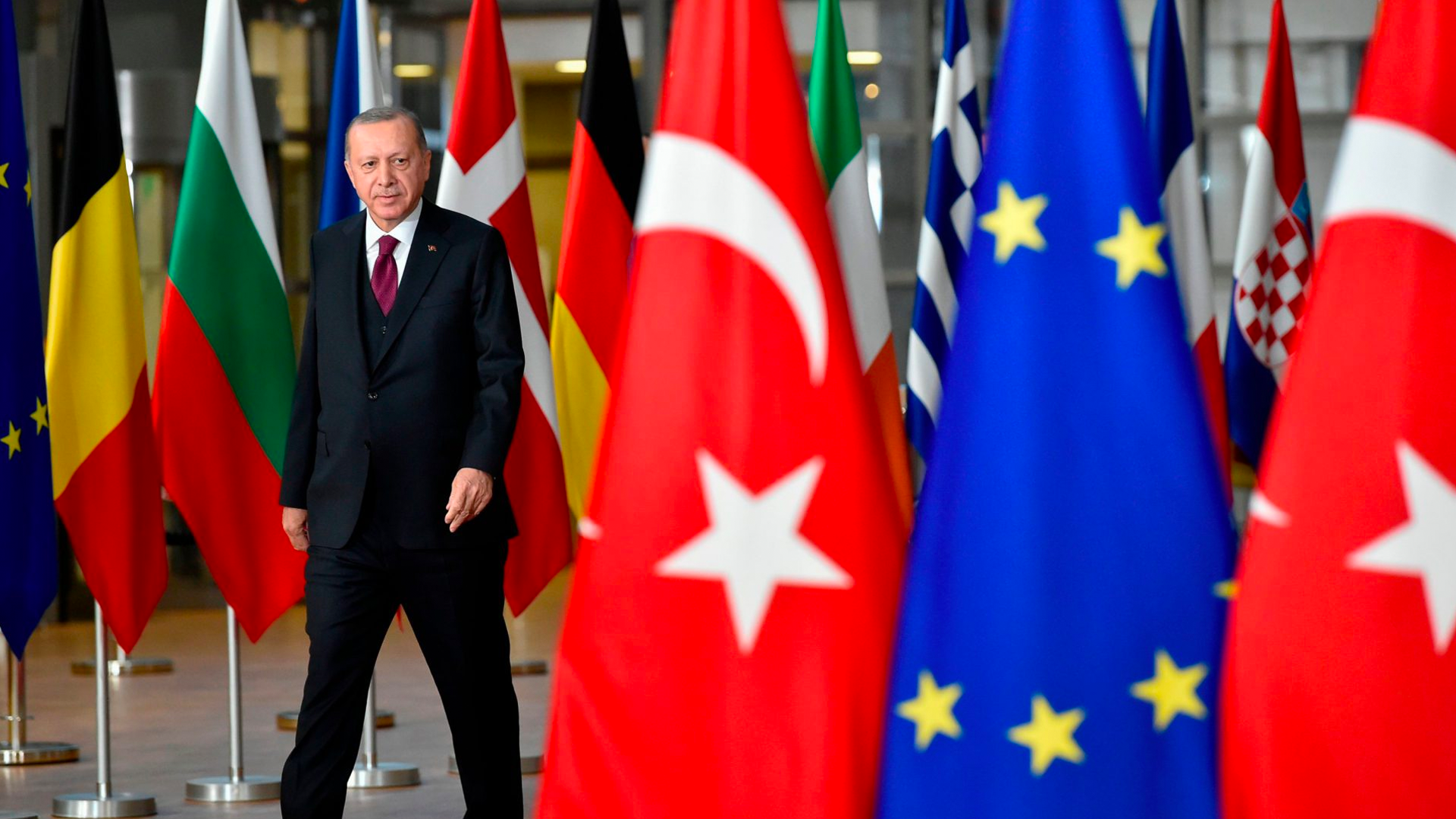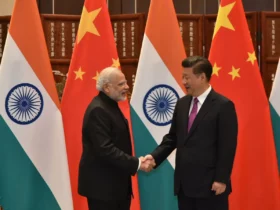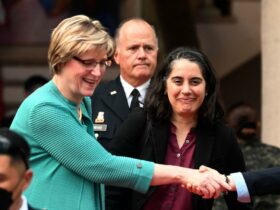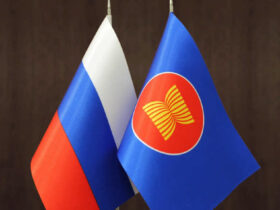The negotiations between the European Union and Turkey are in progress. The President of the European Council, Charles Michel, and the President of the European Commission, Ursula von der Leyen made an official visit to Turkey on April 6, 2021. They held meetings with Turkish President Erdoğan.
The Turkish press reported of a warm encounter. Pro-government newspaper Yeni Şafak titled “Warm messages from the EU”. The top selling Hürriyet presented a photo of President Erdoğan welcoming von der Leyen, with the headline “heartfelt greetings to Europe”.
Both the European as well as the Turkish side commented on the meeting positively. The main topics of the meeting were: the situation in the Eastern Mediterranean and the Aegean Sea, the Cyprus question, Syrian refugees, visa liberalization for Turkish citizens, Turkey’s domestic issues and regional issues and the actualization of the Customs Union.
Relations between the European Union and Turkey had been almost frozen, with the membership process effectively halted due to the stop in negotiating new chapters of EU law legislation to Turkish domestic law. The EU was even preparing to introduce sanctions on Turkish entities especially within the context of the conflict in the Eastern Mediterranean and Turkey’s Libya policy. European navies searched Turkish ships, suspected to breach the arms embargo.
But 2021 started with what the media called the “Turkish charm offensive”, with President Erdoğan declaring, “full membership in the EU is Turkey’s strategic target”.
The European Council acknowledged Turkey’s rapprochement in its Statement of March 25, and the recent visit displayed an evolving consensus on a range of issues.
Eastern Mediterranean
The struggle over the reach of Exclusive Economic Zones between Greece, Greek Cypriot Administration of Cyprus on the one side and Turkish republic of Northern Cyprus and Turkey on the other has caused considerable tension in the past years.
The March 25 Statement already “welcomed” that Turkey stopped “illegal” drilling activities in the Eastern Mediterranean.
The positive evaluation by the European Union also relied on the fact that on January 25, so-called exploratory tasks between Greece and Turkey started again after a pause of 5 years. The US Think Tank Stratfor reports that the Turkish side tries to include matters of maritime boundaries into these talks, which are evaluated as helpful “to avert a dangerous military conflict between two NATO members”.
European Council President Michel “welcomed” both the exploratory talks as well as the upcoming visit of the Greek Foreign Minister to Turkey, scheduled for the 14th of April.
The United States also expressed satisfaction, with the State Department spokesperson stating to “support all efforts to reduce tensions in the Eastern Mediterranean”.
Turkey’s President Erdoğan has proposed to hold an international conference on the Eastern Mediterranean with participation of all coastal countries. The March 25th Statement of the European Council has already “invited the High Representative to take work forward”.
The Cyprus Question
A debated matter on this conference will be the participation of both sides of Cyprus, the Greek Administration in the south and the Turkish Republic of Northern Cyprus in the north, representing two different nations.
The European Union and the Greek side demand a federation of both sides, including a withdrawal of the Turkish military stationed on the island. The Turkish Republic of Northern Cyprus and Turkey on the contrary defend a two-state-solution.
Talks between the two sides are scheduled for end of April to take place under UN organization. Following the EU visit to Turkey, Greek President Anastasiadis declared, “I wouldn’t say I am optimistic”.
Meanwhile, Turkish Presidential Spokesperson İbrahim Kalın called the EU, in reference to the conflict in the Mediterranean and Cyprus, “not to allow that some member countries hijack the Turkish-European relations”.
Syrian Refugees
Another topic in the meeting between the Turkish President and the European Union’s leadership were the Syrian refugees in Turkey. Turkey and the European Union agreed on a joint statement in March 2016, according to which Turkey secures the border to the EU, takes back all illegal immigrants and in exchange, the EU will support the programs with funds.
The Turkish side prioritized the topic to a high degree, with the Presidential Spokesperson Kalin demanding a new agreement and accelerating the transfer of funds for Syrian refugees both in Turkey and inside Syria.
Kemal İnat from the Think Tank SETA with close relations to the Turkish government interprets the Turkish demands towards the EU both ways, as advanced burden sharing and support for Turkey’s military and political efforts in Syria to prevent new waves of refugees.
In congruence with this interpretation, Kalın has demanded better coordination between Turkey and the EU regarding the fight against terror organizations in the south of Turkey.
On the European side, it was the European Commission President Ursula von der Leyen who took up the topic. Von der Leyen acknowledged Turkey’s efforts in preventing illegal migration, she asked to resume “return operations from the Greek islands to Turkey” and announced that future funding should enable refugees in Turkey “to earn their own livelihoods”.
Further topics
Both sides expressed the following: the will to modernize the existing customs union, the preparation to launch high-level dialogue and to continue the work on the visa liberalization process.
The European side additionally brought the fight against climate change and deepened people-to-people contacts on the agenda.
Both sides also discussed regional issues such as the situation in Libya and Syria.
The EU representatives expressed criticism over Turkey’s retreat from the Istanbul Convention Preventing and Combating Violence Against Women and Domestic Violence. European Council President Michel expressed “deep worries” concerning the freedom of speech, the targeting of political parties and the media.
Presidential spokesperson Kalın declared that Turkey will continue the struggle against violence targeting women by strengthening domestic laws, and called the EU representatives to respect the independence of the justice in ongoing trials.
Smiling faces hide threats
Both sides commented on the meeting with positive words. EU Commission President von der Leyen declared to having had “an interesting first meeting with President Erdoğan”, the EU and Turkey being “at the beginning of a road” towards “much better relations”. Presidential Spokesperson Kalın stated, “there is no problem that cannot be solved.
Still, the gap between the positions appears to be very wide. The European Union supports Greece’s and Southern Cyprus’ maximalist positions on EEZ border limitations in the Eastern Mediterranean, which effectively limit Turkey’s EEZ to the Gulf of Antalya and convert the Aegean into a Greek sea.
The European position to reunite Cyprus on the other hand ignores national and cultural realities on the island and threatens to convert the island to an Atlantic-controlled huge aircraft carrier, threatening Turkey as well as the whole Middle East.
Turkey is not expected to accept these proposals.
Therefore it comes as no surprise that EU documents still mention severe threats. The Joint Communication to the European Council, prepared by the High Representative and presented on March 22, lists several “restrictive measures”.
These include widening and deepening existing sanctions, restrictions on operations of the European Investment Bank in Turkey, “targeting sectors important for Turkish economy”, such as tourism, and trade bans on goods and technologies in energy related sectors.
The Greek Foreign Minister’s visit to Turkey on April 14 promises the next round negotiations carried out with smiling faces, but clenched fists.

















Leave a Reply